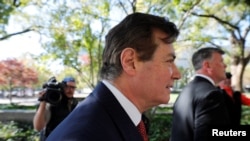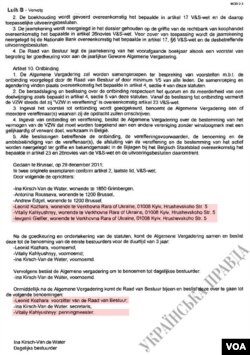Two U.S. firms caught up in the special counsel's indictment against Paul Manafort claim to have been misled about the details of the former Trump campaign chairman's lobbying efforts for Ukraine, but clear warning signals were readily available.
Voice of America's Ukrainian Service has turned up several U.S. and European news articles from 2007 to 2014, and spoken with Ukrainian politicians, that lay out connections between the Brussels-based non-profit that hired the firms and the then-ruling party in Ukraine — a key fact that the lobbying firms claim not to have known at the time.
"Lobbyists should have examined available information carefully at the time of the engagement as a matter of know-your-client procedure," said Gene Burd, a Washington-based international business partner with Arnall Golden Gregory LLP.
He said the two firms — listed in the indictment as Company A and Company B, but recently identified as Mercury Public Affairs and The Podesta Group —should also "have kept up with the changing management situation and sources of financing of the organization."
Manafort, who served as President Donald Trump's campaign chairman for three months in 2016, was indicted in a U.S. federal court Monday on multiple charges including having failed to register as a lobbyist for a foreign government at a time when his firm was acting on behalf of then-Ukrainian president Viktor Yanukovych's pro-Kremlin Party of Regions.
The indictment describes that work as part of a "scheme" by Manafort and co-defendant Rick Gates to generate U.S. support for the party, which favored aligning Kyiv with Moscow instead of seeking European Union membership, as many Ukrainians advocated.
The indictment says both lobbying groups were recruited by Manafort's firm to act on behalf of a Brussels-based non-profit known as the European Center for a Modern Ukraine (ECFMU) from 2012 to 2014. It says the ECFMU was, in fact, a vehicle for advancing the interests of Yanukovych's Party of Regions.
Both firms deny that they knowingly engaged in an image-rehabilitation campaign for Yanukovych's Party of Regions, as the indictment indicates. Their latest public statement reiterates their claim that they were led to believe they were working only for ECFMU, which they understood to be a pro-EU think tank that sought to inform U.S. government officials about Ukraine.
Podesta Group CEO Kimberley Fritts told VOA's Ukrainian Service in August 2016, when their undisclosed foreign lobbying efforts were first reported, that, relying on the opinion of in-house and external legal counsel, her organization lawfully represented ECFMU interests in the United States without registering under the U.S. Foreign Agents Registration Act (FARA).
"Because [our] firm was partnering with Mercury, [Podesta] in-house counsel coordinated with Mercury's [in-house] counsel and Mercury's outside legal counsel," she was quoted as saying in an official statement emailed to VOA from the Podesta group. "Together, they concluded that LDA [Lobbying Disclosure Act] was the appropriate reporting route."
LDA registration is required of U.S. lobbyists representing business and non-governmental foreign interests such as cultural or educational organizations, whereas FARA's more rigorous and legally binding registration disclosures are required to lobby on behalf of foreign governments or political parties.
Fritts also told VOA that the two lobbying groups agreed to work for the ECFMU only after its director filed a written statement verifying that "none of the activities of the Center are directly or indirectly supervised, directed, controlled, financed or subsidized in whole or in part by a government of a foreign country or a foreign political party."
Former ECFMU director Ina Kirsch verified Fritts' account of events, telling VOA that she personally assured Podesta and Mercury legal counsel that ECFMU "has never received any money from the Party of Regions, Ukrainian government or president," and that it received funds from only private companies.
Kirsch also said that ECFMU did not pay any money to the U.S. firms for their lobbying work. That claim is supported by Monday's indictment, which states that "companies A and B," which collectively received more than $2 million for their work, were paid not by the ECFMU, but from offshore bank accounts run by Manafort's firm in Kyiv.
"We believed [Manafort's associate, Rick Gates, who introduced ECFMU to the Podesta Group] was working for [the ECFMU], as we were hired to do," the Fritts statement said.
However, an online search of news articles from 2007 to 2014 reveal Manafort's role as Yanukovych's principal strategist and identify the ECFMU as a vehicle of the Party of Regions.
A 2007 New York Times report on then-prime minister Yanukovych, for example, portrayed Manafort as a "behind-the-scenes" impresario who had taken the "once divisive [Yanukovych], reviled by some [Ukrainians] as a shady reactionary and Kremlin pawn," and turned him into "arguably the nation's most popular politician."
Similar reports by Ukrainian news outlets described the range of Manafort's political lobbying strategies and cited ECFMU documents that positioned the non-profit as a Party of Regions instrument of international influence.
In March 2012, Ukrainska Pravda, one of Ukraine's most influential mainstream news websites, published an ECFMU exposé that listed long-time Party of Regions MP Leonid Kozhara — who went on to become Yanukovych's foreign minister in December of that year — as head of the ECFMU. The article also identifies two other prominent Party of Regions MPs, Evgen Geller and Vitaly Kalyzhny, as ECFMU founders.
In a June 2012 interview with Kyiv-based Glavcom, Kozhara mentions the center's financial dependence on government sources and describes its alignment with his government's international objectives.
Glavcom reporter: It is known that you have co-founded the European Center for a Modern Ukraine, which looks like it is busy with improving the image of Ukrainian authorities as related to the case of [then-imprisoned former Prime Minister Yulia] Tymoshenko. Is this so?
ECFMU's Kozhara: ... When I received an invitation from Brussels to chair the European Center for a Modern Ukraine, I was honored. I saw it as an acknowledgment of my work.
When asked about the sources of ECFMU financing, Kozhara said: "As all NGOs, we have membership fees, but business structures and government structures all give money. If they want to receive the assistance, they should pay membership fees."
In an August 2016 interview with VOA, Kozhara denied having ever held a position with the ECFMU, describing himself as an unpaid board member of various NGOs, of which ECFMU was but one.
Manafort and Gates are accused of serving as unregistered foreign agents of Ukrainian interests in violation of Department of Justice registration requirements.
Between them, Manafort and Gates controlled 12 domestic entities, 12 Cyprus-based entities and three other foreign entities, according to the indictment. In all, $75 million passed through the offshore accounts. Manafort is alleged to have laundered more than $18 million. Gates is accused of laundering more than $3 million from offshore accounts.
Podesta Group founder Tony Podesta, a long-time Democratic Party fund-raiser and brother to former Clinton campaign chairman John Podesta, abruptly resigned from the group hours after the indictment was made public. John, who co-founded the group with his brother in 1988, has not been associated with the group since the 1990s and is not associated with the indictment.
The Podesta Group lobbies on behalf of various foreign interests, including the governments of Azerbaijan and Saudi Arabia. It has also represented Sberbank, Russia's largest bank.
According to the New York Times, Mercury partner Michael McKeon issued a statement that the firm "takes its obligations to follow all laws, rules and regulations very seriously" and "has and will continue to fully cooperate with the Office of the Special Counsel in its investigation."
No charges have been brought against Tony Podesta, his former lobbying group or Mercury, but all have been subpoenaed for records and testimony regarding their work with Manafort, Gates and the ECFMU.
This story originated in VOA's Ukrainian Service.









